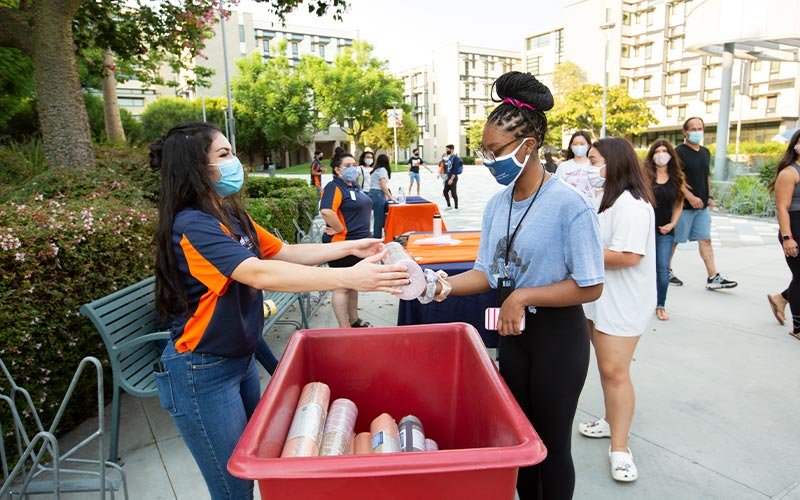
When Beyoncé Diaz moved into Cal State Fullerton student housing for the fall semester, she brought with her only the essentials: laptop, school supplies, clothes, toiletries — and hand sanitizer and masks.
For Diaz, living on campus will be much different this fall semester than this time last year when there was a sense of normalcy in everyday life — before the coronavirus pandemic.
Balancing the health and safety of students, staff and faculty, far fewer students are making the residence halls their home away from home.
“Due to the impacts of COVID-19, the university has a limited capacity for on-campus housing,” said Larry Martin, executive director for housing and residential engagement and the Titan Experience.
Compared to the 2,000 students who normally live in the residence halls each academic year, only 250 students — incoming freshmen to graduate students — are currently living in campus housing. The majority of fall 2020 courses are being delivered virtually, consistent with the California State University system’s directive, with a limited number of classes held in-person.
A contactless move-in was held last week over three days, with a handful of students settling into the apartment-style residence halls at a time. The new residents also were asked to pack light — in case of a housing shutdown due to COVID-19, Martin said.
In efforts to follow local, state and federal health and safety regulations, including safe physical distancing measures, priority for campus housing was given to students taking an in-person course, experiencing housing insecurity and whose permanent homes are not close to the university, Martin said. Decisions about housing for the spring semester have not been made.
This fall semester, students are living in the apartment-style residence halls only, occupied by one or two students per unit. For their health and safety, students have their own bedroom and bathroom, Martin said. The Gastronome, the on-campus dining facility, is offering only takeout food.
Additionally, nearly half of the number of staffers and student staff — three staff members and 24 student resident advisers and peer mentors — are living in the university’s housing community, along with a faculty-in-residence.
To engage housing students in campus life, virtual academic and social programming is ramped up, with events such as college meet-and-greets, workouts and how to make no-sew masks.
“We’re trying to provide as much virtual programming as possible so students make connections with the university, engage in social activities and stay on track academically,” Martin said.
Calling Campus Home
Diaz lived in campus housing last academic year as a first-year student. But this time, she moved in as a student resident adviser. Her role is to create community and relationships between the residents and connect peers to resources.
“This role will help me in my own college journey because it will teach me to have better communication skills, and learn how to be a good adviser and advocate for others,” said Diaz, a psychology major whose career goal is to become a juvenile probation officer or crisis worker for domestic violence.
“Growing up, I did not have a great support system, so now I want to be that individual who is a support system for others and ensures that everyone feels welcomed and safe within the community.”
While classes, and social and academic programming will be virtual, Diaz is optimistic about making the best of the new school year.
“I wanted to live on campus to get the full college experience — have late night study sessions with classmates, nap in my room before an afternoon class, go to the Gastronome for dinner with friends and join clubs. I love the social aspect. When you get involved, you meet new, amazing people with the same interests as you,” she said.
“Because of the pandemic, I will miss these in-person interactions. But I understand social distancing in housing is necessary, and hopefully someday, we can go back, and once again create these great moments of college life.”
Visit the Titans Return website for more information.
Contact: Debra Cano Ramos, dcanoramos@fullerton.edu